One Taken the Other Left
One Taken the Other Left: What did Jesus mean when He said, “one will be taken and the other left” in Matthew chapter 24 verses 40 and 41? Was He really telling us of a secret rapture that would come upon the saved in the end times, or does it mean something else entirely different?
In this study and presentation by Pastor Stephen Bohr of Secrets Unsealed, we will discover the glorious truth of these words, and also in what way the end days will be the same as those of the days of Noah. Please watch the video presentation and refer also to the transcript as your study notes so that you will see clearly what Pastor Bohr is presenting.
In our subject for today we are going to study two verses that we find in the Gospel of Matthew chapter 24 verses 40 and 41.
It says here.
“Then shall two be in the field; the one shall be taken, and the other left. Two women shall be grinding at the mill; the one shall be taken, and the other left.” Matthew 24:40-41
Now according to these two verses there is going to be a group that will be taken, and another group which will be left when Jesus comes.
Now I need to explain how these verses have been understood traditionally in the Adventist Church, as well as by those who believe in the rapture. Generally

One Taken and the Other Left A New Look at the Blessed Hope Bohr
-
One Taken and the Other Left A New Look at the Blessed Hope Bohr
One Taken the Other Left: What did Jesus mean when He said, “one will be taken and the other left” in Matthew chapter 24 verses 40 and 41? Was He really telling us of a secret rapture that would come upon the saved in the end times, or does it mean something else entirely different?
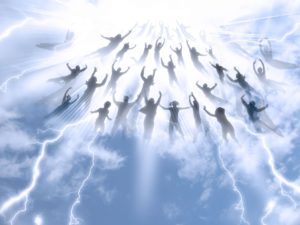 speaking, the Seventh-Day Adventist Church, the scholars of the Seventh-Day Adventist church have taught that the one who is taken is taken to heaven when Jesus comes, and the one who is left is left behind on earth when Jesus comes.
speaking, the Seventh-Day Adventist Church, the scholars of the Seventh-Day Adventist church have taught that the one who is taken is taken to heaven when Jesus comes, and the one who is left is left behind on earth when Jesus comes.
Now those who believe in the rapture basically believe the same thing about the word taken, and the word left, they believe that the one taken is the saved person who is taken to heaven, and they believe that the one who is left, is left behind.
The only difference between the view of the Adventist Church and the view of those who believe in the rapture is when one will be taken, and the other left.
As Seventh-Day Adventists we believe that when Jesus comes the second time in power and glory in the only second coming, Jesus will take the saved to heaven, and He will leave the lost behind.
That’s the traditional Adventist view, those who believe in the rapture believe that before Jesus comes in His glorious coming he will take the church to heaven in what has been known as the rapture, and they believe that at that time the righteous will be taken to heaven, and the wicked will be left behind.
So basically the Seventh-Day Adventist church, as well as those who believe in the rapture understand the taken ones to be the saved, and the ones left behind are the lost. The only difference is when the righteous are taken and when the wicked are left.
In this study we are going to look at another option which I believe is the true biblical option. We need to be careful that we read the Bible carefully, we should not put into the Bible what is not in the Bible, now I want you to notice what this text does not say.
The text does not say one shall be taken with Jesus to heaven, and the other shall be left behind on earth. Neither does the text say that those who are taken are the righteous, and those who are left are the wicked.
The words righteous and wicked are not there; the word heaven and earth are not there, the text simply says that one is taken and the other is left.
We need to analyze what the Bible means by taken, and what it means by left. As a matter of interest this is the passage that inspired the name of the series “Left Behind,” in fact the 12 volume series Left Behind gets its name from these two verses of Matthew chapter 24.
Now we need to take a look at a very important word in verse 40, sometimes the most important words are the smallest ones, notice Matthew chapter 24 and verse 40.
What is the word that this verse begins with?
One Taken
“Then”! Is that a time word, does it denote time? Yes; in fact, several times in Matthew 24 the word “then” which is the Greek word tóte, [tot-eh] is used to delineate a sequence of events, or a chain of events, one happening right after the other.
It says “then this will happen”, “then that will happen”, “then the other thing will happen”.
In other words it is a word that indicates the time-frame in which events take place. So notice that verse 40 begins by saying, “then shall two be in the field”. The question we must ask is when is the time that the word then applies, and where should we look to find out which event the word then is referring to? We would have to go back to the previous verses, so let’s go to verses 37 to 39 to see when this is going to take place.
Notice Matthew chapter 24 and verse 37.
“But as the days of Noe were, so shall also the coming of the Son of man be.” Matthew 24:7
By the way the word “coming” here is the word parousia.
Verses 38-39 One Taken
” For as in the days that were before the flood they were eating and drinking, marrying and giving in marriage, until the day that Noe entered into the ark, And knew not [that is those who were outside the ark] knew not until the flood came, and took them all away; so shall also the coming of the Son of man be.” Matthew 24:38-39
Let me ask you at what moment is it that one will be taken and the other will be left, at what historical event? Clearly this will happen at the moment of the second coming of Jesus Christ.
“so shall also the coming of the Son of man be.”
Now how many groups according to verses 40 and 41 will there be at the coming of the Son of man?
There will be two groups, there will be the group who will be saved, and there is the group that will be taken away.
Now notice the expression, “the flood came and took them all away”. So who was taken away, the righteous or the wicked?
One Taken
The wicked were taken away according to this passage.
“…and took them all away.”
Now I want you to notice that Luke expresses it a little differently, Matthew says that when the flood came the flood took them all away, but Luke expresses it a little differently.
Notice Luke chapter 17 and verse 26, once again it’s speaking about the same event as we found described in Matthew chapter 24.
May I just say that there’s a special word that is used for flood in the days of Noah, it’s used only for the flood that took place in the days of Noah; it’s the Greek word ‘”ataklysmos”, which is the same word which is used to derive cataclysm in the English language. In other words the flood in Noah’s day was some secret event right? Absolutely not! It was a cataclysm.
By the way, when the Old Testament speaks about the flood in Noah’s day, it also uses a word that is used exclusively for the flood of Noah’s day, even though there are many Hebrew words for flood, there is one Hebrew word that is used exclusively for this flood of Noah’s day.
The word is “mab·bül'”, which basically means to turn upside down, it’s synonymous in a different language with the word cataclysm, in other words the one will be taken and the other will be left when this cataclysm, or this catastrophe takes place.
Now let’s go to Luke 17 verse 26. One Taken
“And as it was in the days of Noe, so shall it be also in the days of the Son of man. They did eat, they drank, they married wives, they were given in marriage, until the day that Noe entered into the ark, and the flood came, and destroyed them all.” Luke 17:26-27
Matthew says that the flood came and took them all away, the Gospel of Luke says that the flood came and destroyed them all.
So who were the ones that were taken away? The ones who were destroyed.
Let me ask you; who are the ones who were left? The ones that were left were the ones who survived the flood, isn’t that right? The other ones were taken away, the wicked were taken away and the righteous were left.
One Taken
In a minute I’m going to prove it to you; now notice Luke chapter 17 verse 29, there’s another event that Jesus uses to compare his coming with.
“But the same day that Lot went out of Sodom it rained fire and brimstone from heaven, and destroyed them all.” Luke 17:29
How many of the inhabitants of Sodom and Gomorrah were left after the cities were destroyed with fire? There were none left. How many groups were there? Two; those that were in the city, every single one was destroyed. Whereas Lot and his family were preserved, or we’re saved. Does that make sense so far?
Now we need to go back to the Old Testament to analyze the story of the flood, we can’t just stay in Matthew because in Matthew you have a reference to the flood, so Jesus is telling us in Matthew in order to understand this you have to go back to Genesis. So the broader context of what we find here in Matthew 24 is the flood story in the Old Testament, now we’ve noticed from Matthew 24 that there were two groups.
There was one group which was totally destroyed, every single one of them, and there was another group which was preserved. Both like in the days of Noah, and in the days of Lot.
Now let’s take a look at Genesis chapter 7 and examine the flood story because that’s where Jesus is sending us.
Genesis chapter 7 and verses 22 and 23.
“All in whose nostrils was the breath of life, of all that was in the dry land, died. And every living substance was destroyed which was upon the face of the ground, both man, and cattle, and the creeping things, and the fowl of the heaven; and they were destroyed from the earth: and Noah only remained alive, and they that were with him in the ark.” Genesis 7:22-23
In speaking about the flood in Noah’s day it says all in whose nostrils was the breath of life, of all that was in the dry land, died. And every living substance was destroyed! In Luke it also says that they were destroyed, and in Matthew t is implied. So it says every living substance was destroyed which was upon the face of the ground, both man, and cattle and the creeping things, and the foul of the heaven; and they were what? Here’s the word again, they were destroyed from the earth: and Noah only. What’s the next word? “Only remained alive”. Only Noah remained alive, and they that were with him in the ark.
How many groups were there? Two groups! Which was the group that was destroyed? The wicked! Witch was the group that remained? The saved!
Now I’d like to look at how several modern versions translate Genesis 7:23. What would be a synonym of remained? Only Noah remained along with his family, only Noah was left.
Let’s look at several versions that translate it this way, and then we’re going to do an analysis of this word in the old and new Testament. So we will deal with technical matters, as we have to understand these matters when we deal with people who use these verses to try and teach the rapture.
Don’t we have to have a reason for the faith that is in us? We do not want these people to be on this earth during the tribulation when they haven’t been prepared for the tribulation.
So we need to help them better understand these verses. You know somebody who was an Adventist once said to me. You have all of this analysis of words and contexts, and he say’s everything is very clear, it says one is taken and the others left, clear as day, the taken ones are taken to heaven and the left ones are left behind. He said to me isn’t it true that Jesus is going to take us to heaven when He comes? I said yes. And he said isn’t it true that the wicked are going to be left behind? I said yes; there are texts in the New Testament that talk about it that way. He says well there you have it.
I said that doesn’t mean that taken and left means the same thing in this passage.
So we need to analyze the total context and the meaning of words etc.
The NIV which is the most used version today says that the
“wicked were wiped out, and only Noah and his family were left.”
The New American standard bible says that all of the
“wicked were blotted out, and only Noah and his family were left.”
The Revised Standard Version says that the
“wicked were blotted out, and only Noah and his family were left.”
The Jerusalem Bible which is a Roman Catholic Bible says that all of the
“wicked were destroyed and only Noah and his family were left.”
The new English Bible says that the
“wicked were wiped out, and only Noah and his family survived.”
So what does it mean when it says that Noah and his family remained, or survived?
It means that only they were left. By the way the word that is translated “destroyed” here in Genesis 7 in the King James Version is referring to those who were destroyed by the flood is not the common Hebrew word for “destruction”, It is a word that means to wipe out, to blot out, to erase, to totally eradicate.
Now ask yourself; when the flood came; did anyone outside the ark survive, or was it only those who were inside the ark? How many kinds of people were outside the ark? Only one kind of person, and all of them were destroyed.
Those who use this passage for the rapture have a very big problem because they say that the righteous will be taken to heaven at the rapture, and only some of the people on earth will be destroyed but others will be left alive, it is important to understand this point.
They say that airplanes will crash, and cars will crash because they’ll be left without pilots, and without drivers, and ships will collide in the sea. So according to them people will be left alive after the rapture.
Does this fit the model of the flood? No, because in the flood there weren’t the saved in the ark, and also those outside the ark of whom some were saved and some were destroyed. Because in the flood all who were outside the ark were destroyed.
So this idea that the text says that one shall be taken and saved, and the other left behind alive, is not correct as the text says that all who were inside the ark were saved, and everyone outside the ark were eradicated. So those who believe the rapture are deceived as their understanding doesn’t fit the context, because the context says that it will be like in the days of the flood, in the days of Noah will be the coming of the Son of Man.
Does that make sense? So this verse cannot refer to a pre-tribulation rapture.
One Taken
Now let’s look at a quote from a Hebrew scholar whose name is Gary G Cohen, and he defines the Hebrew word “left”. The very word that’s used in Genesis 7:23, the word “left” which is translated
“remained” in the King James Version, and translated ‘survived’ in other versions, but it’s translated in most of them as “left”. It’s the Hebrew word “shawar” ,now here comes the statement
“Shawar seems to be used exclusively to indicate the static action of surviving after an elimination process. This process of elimination may have been natural, (Ruth 1:3: Naomi’s husband died and she was left)… it may have been humanly caused ( I Samuel 9:24: ‘Behold that which is left!’ here Samuel is speaking of meat which was intentionally left for Saul to eat). Or the elimination may have been the direct result of a divine intervention… (Exodus 10:19. “There remained not one locust in all the coasts of Egypt,” when God blew them away). No matter what the cause, however, shawar points to that which remains, or has survived.” Gary G . Cohen, Theological Wordbook of the Old Testament, volume 2, p.894
So how about the scenario that says when Jesus comes the ones that are left are the ones that are left for destruction. It doesn’t fit the meaning of the word at least in the Old Testament. And you say how can we use the Old Testament meaning of the word? Because in Genesis 7:23 it’s referring to the same event as Matthew 24. In Genesis 7:23 you have two groups, it says one of them was destroyed and the other one was left. Do we have that with relation to the flood in Matthew 24 and Luke chapter 17, is there a group which is destroyed or taken away? Yes! And there’s another group which is left, one will be taken and the other left.
So those who believe in the rapture have it the wrong way around, so the left ones are the ones who survive, and the taken ones are the ones that are destroyed.
If you’re not yet convinced then that’s OK because we haven’t completed our study as we have more examples from the Old Testament of the word ‘shawar’ to analise.
We looked at the definition from a Hebrew scholar, now let me give you some Bible verses, Exodus 14 verse 28, it’s speaking about the destruction of the Egyptians in the Red Sea it says here,
“The waters returned and covered the chariots and the horsemen, even Pharaoh’s entire army that had gone into the sea after them; not even one of them (shawar) remained. Not one single one was left.” Exodus 14:28
The King James translates it “there remained not so much as one of them.”
So let me ask you, who were the ones who remained here in this verse? If anyone had been left they would have survived, in other words the survivors are those who are left, the other ones were washed away were destroyed.
One Taken
Notice judges chapter 4 verse 16; it says
“But Barack pursued the chariots and the army as far as Harosheth-hagoyim, and all the army of Sisera fell by the edge of the sword; not even one was left.” Judges 4:16
In other words no one survived, if someone had been left then they would have been saved; but no one was left alive. No one was saved because everybody was destroyed!
Notice also in Isaiah chapter 4 and verse 3, once again the word ‘shawar’ is used here, it says there.
“And it shall come to pass, that he that is left in Zion, and he that remaineth in Jerusalem, shall be called holy, even every one that is written among the living in Jerusalem:” Isaiah 4:3
“He that is left in Zion, and he that remaineth in Jerusalem shall be called holy” So who are the ones who are left? The ones that are left shall be called Holy, and they will be everyone who is found among the living in Jerusalem.
So what does the word “left” refer to in the Old Testament? It refers to those who remain alive when catastrophe, or this worldwide cataclysm come upon us.
Now if you go to a concordance you’ll find even more supportive evidence if you search for the words “left”, or “remained”, or “survived”, and you’ll find many references to this word in the Old Testament.
Now you’re saying well pastor that’s Old Testament, Actually it doesn’t even matter if it’s the Old Testament, and do you know why? Because Jesus in Matthew 24 sent us back to Genesis, sure it’s different languages but it’s the same event.
Now let’s notice the use of this word in the New Testament: The New Testament word that is found in Matthew 24 verse 40 and 41 is the Greek word aphiēmi, [ä-fē’-ā-mē] the word is used in two senses in the Greek, and by the way it’s used also in two senses in the English, for example it describes first of all someone leaving from one place to another, for example if I said that pastor Jensen left the room then that’s one sense in which this word aphiēmi is used in the Greek.
One Taken
But there’s another sense in which it’s used also in the New Testament as in this he ate all the apple pie, and none is left, both of those senses are used in the New Testament for the word aphiēmi, which is where the word “left” comes from in Matthew chapter 24:40-41.
Now let me give you two examples of this word to show that it’s what remains, or what is left, Matthew 24 and verse 2.
It’s speaking about the destruction of the temple and notice what Jesus says.
“And Jesus said unto them, See ye not all these things? verily I say unto you, There shall not be left [aphiēmi] here one stone upon another, that shall not be thrown down.” Matthew 24:2
Can you see the sense of the word here? No stone will be left upon, or will remain upon another after the temple is destroyed.
Notice mark chapter 12 and verse 22 another use of this word left, or aphiēmi which is used in Matthew 24 and verse 40. It’s speaking about the woman who had seven husbands, it says.
“And the seven had her, and left no seed: last of all the woman died also.” Mark 12:22
“And the seven had her and left no seed” In other words no seed survived, there was no seed left. So notice that the word left [aphiēmi] is used in the same sense that it is used in the Old Testament, the word shawar, that which remains, that which is left over, or that which survives.
One Taken
So what does the word left mean? it means that which will survive, that which will remain after the destruction, that which is left after the destruction, that’s what it means.
Can you see how important it is to study the meaning of words, most people superficially go to this text and say it’s clear that there’s going to be a pre-tribulation rapture, there’s going to be a group taken to heaven and there’s going to be a group left behind, the ones taken to heaven are the saved and the ones left behind are the wicked, and they say what part of that don’t you understand? And then you will have to explain to them why they need to study everything in all the light that the Bible teaches on the matter because things might appear to say one things on the surface, but they’re really not saying that at all.
Now we need to take a look at the word “taken”. It’s the Hebrew word “lakad” and I’m quoting now from Walter C. Kaiser a renowned expert in Old Testament Hebrew, he says this.
” Most of the 121 uses of lakad deal with men capturing or seizing towns, men, spoils, and even a kingdom (I Samuel 14:47). It is used figuratively of the entrapment of men who are caught in snares of all sorts laid by their enemies (Jer. 5:26; 18:22; Ps. 35:8). This word serves as a figure of divine judgment. (What does the word taken mean? It’s a figure of divine judgment) The stone of stumbling will cause many to stumble, fall, be broken, be ensnared, and be captured (Isa. 8:15) when God shakes the foundations of the earth, just prior to the millennium (‘many days’ of Isa. 24:22), the ungodly shall be seized in the trap (Isa. 24:18), [the word seized is the word taken Isaiah 24 verse 18 he quotes] as were those who drunkenly mocked the prophet’s message (Isa. 28:13).” Walter C. Kaiser, Theological Wordbook of the Old Testament, vol. 1, p. 480.
So what does the word taken mean? It means to overcome a kingdom, or to overcome an individual, it means to seize, it means to take as taking a kingdom in war.
Now we need to take a look at some text’s from the old testament to corroborate this view go with me to Joshua chapter 8 and verse 8 and we’re going to read verse 8 and then we’ll go to verse 17 verse 21 and verse 22.
There are several key words here that I’m going to underline, it says there in Joshua 8 verse 8.
“And it shall be, when ye have taken [That’s the word lahad] the city, that ye shall set the city on fire: according to the commandment of the LORD shall ye do. See, I have commanded you.” Joshua 8:8
And when you have “taken” the city you shall set it on fire and burn it up. So to take the city is to burn it up.
And then verse 21.
“And when Joshua and all Israel saw that the ambush had taken [That’s the word lahad] the city, and that the smoke of the city ascended, then they turned again, and slew the men of Ai.” Joshua 8:21
Now notice in verse 17
“And there was not a man left in Ai…”
This is a very interesting passage because it uses both words it uses the word taken “Lahad” that refers to those who were destroyed, and the word left “shawar” which refers to those who remained; if they had remained that is, because no one remained.
Let’s notice once again it says
And when Joshua and all Israel saw the ambush had taken the city, and that the smoke of the city ascended, then they turned again and slew the men of AI. And there was not a man left in AI. That’s because no one survived, no one remained because they were all destroyed. If someone had been left they would have been saved.
And then it says
“And there was not a man left (shawar) in AI or Bethel, that went not out after Israel: and they left the city open, and pursued after Israel. And the other issued out of the city against them; so they were in the midst of Israel, some on this side, and some on that side: and they smote them, so that they let none of them remain or escape.” Joshua 8:17, 22
“so that they let none of them remain or escape” See there you have the Hebrew word shawar again, no one remained. I want you to remember that word escaped because we’re going to come back to it. The word remained there is the Hebrew word shawar, but the word escape is a different word.
Now notice judges 1 verse 8; another use of this worth taken, it says.
“Now the children of Judah had fought against Jerusalem, and had taken it, and smitten it with the edge of the sword, and set the city on fire.” Judges 1:8
One Taken
What does it mean that the city was taken? It means that the city was smitten by the edge of the sword, and it was what set on fire. So does the word taken refer to taking the righteous people somewhere, or does it refer to those who are overtaken and destroyed?
It refers to those who are overtaken and destroyed.
Notice also proverbs 5 verse 22, here it speaks about an individual; it says speaking about the wicked.
“His own iniquities shall take the wicked himself, and he shall be holden with the cords of his sins.” Proverbs 5:22
The word “take”; is the Hebrew word “Lahad” so it says “His own iniquity shall take the wicked himself.” What does that mean? “shall take him” It means that his sins are going to destroy him, and he shall be holden with the cords of his sins; in other words he’s going to be strangled by his sins.
Notice Ecclesiastes 7:26, this is a very important verse because of several words that are used, we’ll come back to these words later, Ecclesiastes 7:26 say’s.
“And I find more bitter than death the woman, whose heart is snares and nets, and her hands as bands: whoso pleaseth God shall escape from her; but the sinner shall be taken by her.” Ecclesiastes 7:26
Notice the words “snares”, and “nets”, and “her hands as bands” whoso pleaseth God shall “escape” from her; but the sinner shall be “taken” by her. One Taken
Three keywords:
#1 “snares” she’s like a snare
#2 “escape” the one who follows the Lord shall escape from her. So the righteous shall escape.
#3 “taken” And the sinner will be taken, that is that they will be destroyed
Remember the three key words “snares”, “taken” and “escape”.
Now notice also Isaiah chapter 8 verses 14 and 15 this is a messianic prophecy, it says.
“And he [that is the Messiah] shall be for a sanctuary; but for a stone of stumbling and for a rock of offence to both the houses of Israel, for a gin and for a “snare” to the inhabitants of Jerusalem. And many among them shall stumble, and fall, and be broken, and be snared, and be “taken” [the Hebrew word Lahad].” Isaiah 8:14-15
Who are the taken ones here, the righteous or the wicked? It is the wicked ones, it gives several synonyms, stumble, fall, be broken, snared, and taken.
Taken refers to the lost, it does not refer to the saved.
Now notice Luke 21 and verses 35 and 36 notice the word snare and escape that are used, and how Jesus uses these words in connection with his second coming, how He applies them to the wicked; it says there. One Taken
“For as a snare shall it come on all them that dwell on the face of the whole earth. Watch ye therefore, and pray always, that ye may be accounted worthy to escape all these things that shall come to pass, and to stand before the Son of man.” Luke 21:35-36
“A snare shall it come on all them that dwell on the face of the whole earth” It is the second coming of Christ that will come as a snare.
“That ye may be accounted worthy to escape all these things that shall come to pass”
So it is the righteous who escape, the wicked ones are caught in the snare. Notice here how it is the Old Testament word snare, and the word escape that are used in the context of the word taken in referring to the wicked; and that point is very clear.
Notice Isaiah 24 and verse 6: This verse is speaking directly about the second coming of Christ, we don’t have time to go into all of the details but if you read verse 1 it says that the earth is going to be made empty, it’s going to be laid waste and turned upside down. Verse 3 says that it’s going to be utterly empty and it’s going to be utterly spoiled, later on it speaks about a global earthquake and it says the whole earth is going to tremble, and it’s going to move back and forth. In other words this is a worldwide catastrophe, this is the second coming of Christ, and here is what it say’s.
“Therefore hath the curse devoured the earth, and they that dwell therein are desolate: therefore the inhabitants of the earth are burned, and few men left.” Isaiah 24:6
Who are the left ones in this verse? It is the wicked who are burned, the ones who are left are the righteous, they are the ones who are saved, and everyone else is burned up. One Taken
And what about the word ‘wicked’, do you know that in this following chapter the word taken is used to refer to the wicked, let’s read verse 17, it says.
“And it shall come to pass, that he who fleeth from the noise of the fear shall fall into the pit; and he that cometh up out of the midst of the pit shall be taken in the snare…” Isaiah 24:17
Who are the taken ones? The wicked! Who are ones left, the ones that are not burned and are left alive? They are the saved!
Then the passage continues saying
“…for the windows from on high are open, and the foundations of the earth do shake.” Isaiah 24:17
So the word taken means the destroyed, and we’ve already proven Biblically that the word left means those who are left alive when the destruction comes, and we’ve proven from the Old Testament that those who are taken are the ones who are destroyed, but what about the New Testament, what about the word taken in the New Testament?
Well allow me to say that the Greek word which is translated ‘taken’ in the New Testament is the Greek word “lambano”, and I’m going to have to give an explanation to help us understand the characteristics of this word.
The word “lambano” is the word that is used to translate ‘taken’, now this is a very versatile word and it can mean many different things, one of its basic meanings however according to the Greek English lexicon of “Arndt and Gingrich” which is one of the best lexicons, one of the best Greek English dictionaries that exists in the world today. One Taken
One of the definitions of the word “lambano” is [to take away, to remove, to lay hands on, or to seize.] Now there are examples in the New Testament of the use of this word, to seize, to lay hands on, to take away, for example in Acts 2:23 we’re told that Jesus was taken or seized, to be crucified. In Matthew 21 verse 39 we find that Jesus was seized and cast out of the vineyard by his enemies, and in first Corinthians chapter 10 and verse 13 it says that no temptation has taken us which cannot be overcome. One Taken
So the word “taken” can mean to “seize”, in the same sense in which it is used in the Old Testament.
Now I need to tell you something about Greek words in the Old Testament, and we have this phenomenon also in the New Testament. Did you know that we have many English words that
have a prepositional prefix? Now let me give you some examples of words that are connected with prepositions. One Taken
The word “hypertension”: What does the word hypertension mean? It comes from the Greek [hyper-high] [tension-blood pressure], so hypertension is “high blood pressure”.
Then you have the word “hypoglycemia”. What does the word hypo mean? “low”, and in Greek “hoopo” means under, or low, so hypoglycemia means “low blood sugar”.
Then you have the word “catastrophe”, it’s the Greek preposition “kata”, and it means is to overturn, or to turn upside down. One Taken
Another word is “perimeter”, of which “peri” is the Greek preposition, and perimeter means the outer boundary; in other words these prepositions denote location, hi, low, around etc.
Then you have the word “Antichrist”, it’s the one who tries to occupy the place; it’s the preposition “anti” which means to take the place of, or it can also mean “against”. One Taken
You have the word “paralegal”, paralegal means one who works alongside a lawyer, because the Greek preposition “para” means alongside, or next to. So in English we attach prepositions to words and they give a sense of direction to the words, high, low, in place off, in other words they give position.
In the Greek language we have the same phenomenon, the word “lambano”, many times is given a prepositional prefix. One Taken
Let me give you four examples of how the word ‘lambano’ has prepositional prefixes that give the sense of location.
1) You have the word “analambano”; “ana” means “up”, “lambano” means to take or to seize, so “analambano” means to seize upwards, or to take upwards.
2) You have the word “sunlambano”, “sun” means “‘with”, so “sunlambano” means to take with, not simply to take. One Taken
3) Then you have the word “katalambano”, “kata” means to overturn or to turn upside down, and “lambano” means to take, so really “katalambano” means to take by overturning or turning upside down.
4) And then you have the word “paralambano”; we have the word paralegal which means to work alongside a lawyer, we have the word “paralambano” which means to be taken alongside someone.
Now let me ask you which of these combinations with the word lambano do you think is used in Matthew chapter 24? It’s hard to guess so I’ll tell you; it’s the Greek word paralambano, which means alongside someone, that is to be taken alongside. One Taken
Now why would the word paralambano be used instead of some other word? Because the text says that there will be two people there, one alongside another; one who is alongside that individual will be taken, [paralambano] the other will be left.
So the correct word which Jesus used is the correct Greek word because it’s talking about two people that are alongside each other, and that’s what paralambano means, it means to take someone who is alongside someone else.
So the Greek word which is used in Matthew 24 is paralambano, which means one will be taken, one who is alongside someone else will be taken, and the other one who is alongside that individual will be left.
Now I’d like you to go with me to 1st Thessalonians chapter 4 and verse 15, it says here. One Taken
“For this we say unto you by the word of the Lord, that we which are alive and remain unto the coming of the Lord shall not prevent [shall not precede] them which are asleep.” 1 Thessalonians 4:15
Now let’s stop there for a minute, and let’s go back and read more carefully: It says.
“for this we say unto you by the word of the Lord that we which are alive” Note very carefully: “we which are alive”, alive and remain. Who are the remaining ones? Those who are receiving Jesus!
“for this we say unto you by the word of the Lord that we which are alive and remain unto the coming of the Lord…” This is the same coming of the Lord as in Matthew 24, it’s the same context.
“…shall not precede them which are asleep,” And now verse 16-17.
One Taken
“For the Lord himself shall descend from heaven with a shout, with the voice of the archangel, and with the trump of God: and the dead in Christ shall rise first: Then we which are alive and remain shall be caught up together with them in the clouds, to meet the Lord in the air: and so shall we ever be with the Lord.” 1 Thessalonians 4:16-17
“Then we which are alive and remain” Who are the remaining ones here? Those who “are alive and remain shall be caught up together with them in the clouds to meet the Lord in the air and so shall we ever be with the Lord.” So who are the remaining ones, who are those who are left?
Those who are left alive are the righteous, not the wicked, so much for the idea that the wicked are left behind and the righteous are taken. Biblically it’s the opposite, the righteous are left alive and the wicked are taken in their sins, and they are destroyed, they are surprised, they overcome, and they are overturned. One Taken
Now you say what about the taken ones, this verse just talks about those who are alive and remain? Well we have to go to the very next chapter, notice 1st Thessalonians 5 verse 2
“For yourselves know perfectly that the day of the Lord so cometh as a thief in the night.” 1 Thessalonians 5:2
“For yourselves” What does the word “for” indicate, why does this chapter begin with the word “for”‘, is there any connection with the previous chapter, does the word “for”‘ indicate a connection with chapter four? Absolutely!
“for yourselves know perfectly that the day of the Lord [the day of the Lord is the 2nd coming of Christ] as a thief in the night.”
And now verse 3. One Taken
“For when they shall say, Peace and safety; then sudden destruction cometh upon them, as travail upon a woman with child; and they shall not escape.” 1 Thessalonians 5:3
By the way; is the Apostle Paul using lot’s of words that Jesus used in Matthew 24 when he warned about the second coming? Did Jesus warn us that He was going to come as a thief, did He warn us there was going to be a group that were going to be taken over by destruction, did he describe His coming as a woman in travail, do you read that in Matthew chapter 24? These are the same identical words, so Paul is describing the same event as in Matthew 24. One Taken
And notice once again.
“for you yourselves know perfectly that the day of the Lord so cometh as a thief in the night. For when they shall say peace and safety; then sudden destruction cometh upon them, as travail upon a woman with a child; and they shall not escape.” I Thessalonians 5:2-3
[There you have the words again, destruction, escape]
Verse 4 One Taken
“But ye brethren are not in darkness, that that day should overtake you as a thief.” I Thessalonians 5:4
Now remember the word paralambano which means to take someone who is alongside, to take from alongside another. The word that is used here is the Greek word katalambano, which applies to the wicked, as it is the wicked who are taken. Paul is speaking of the same event as Jesus in Matthew 24.
The connection with paralambano and katalambano is that they are describing the same group; only Matthew it’s talking of people that are alongside each other, and here in chapter 5 of 1st
Thessalonians the Apostle Paul is not emphasizing that point, he’s talking primarily about the destruction of the wicked, and so he says One Taken
“but ye, brethren, are not in darkness, that that they should overtake you as a thief. Ye are all children of the light, and the children of the day: we are not of the night, nor of darkness. Therefore let us not sleep, as do others; but let us watch and be sober. For they that sleep sleep in the night; and they that be drunken are drunken in the night.” 1 Thessalonians 5 verses 4-7
Let me ask you this, does Jesus use the same terminology in Matthew chapter 24 when he tells us to watch, and does he say don’t go to sleep, does he say don’t get drunk, does he say he’s going to come as a thief, does he say that sudden destruction will overtake the wicked? Yes he does. So Matthew 24 is speaking about the same event as 1st Thessalonians 5.
In Matthew the word is paralambano, ‘one shall be taken’ The Apostle Paul says in I Thessalonians chapter 5 that the wicked will be overtaken, so let me ask you; are the taken ones in Matthew 24 and the overtaken ones in I Thessalonians 5 the same group? One Taken
They are definitely the same group, absolutely no doubt about it.
By the way the word katalambano is also used in John 8:3-4, if you go with me there very quickly it says here speaking about the woman who was taken in adultery One Taken
“And the scribes and Pharisees brought unto him a woman taken in adultery; and when they had set her in the midst, They say unto him, Master, this woman was taken in adultery, in the very act.” John 8:3-4
What does it mean that she was taken in adultery? Surprised, seized, overcome, and then it says “and when they had set her in the midst, they say unto Him master, this woman was ‘taken’ in adultery, in the very ‘act’. One Taken
Now please allow me to do a comparison between what Jesus says in Matthew 24, and what the Apostle Paul has to say in I Thessalonians 5.
These are the words that Jesus uses in Matthew 24 as well as Luke 21
“Left”, “taken”, “watch”, “thief in the night”, “sober”, “destroyed”, “pray”, “escape”, “unexpectedly”: These are Matthew 24 words.
Now here are the words that the Apostle Paul uses in 1st Thessalonians chapter 5
“Remain”, “overtaken”, “watch”, “thief in the night”, “sober”, “destruction”, “pray”, “not escape”, and “suddenly”.
So this is very clearly the same event; the taken in Matthew 24 are the same as the overtaken in the writings of Paul. In the writings of Paul the overtaken are the ones destroyed, and the wicked in Matthew 24 are the ones who are taken. The only thing is in Matthew 24 Jesus speaks about paralambano because one is beside the other, so he has to use the preposition that distinguishes that it is one who is alongside another that will be taken. The Apostle Paul is not emphasizing that one will be taken, and the other left. So the Apostle Paul uses the word katalambano which means to overcome, it means to overturn, or it means to destroy, but once again the taken ones, or the overtaken ones are not the saved; they are the lost.
So: In I Thessalonians chapter 4 those who are alive and remain are the righteous. One Taken
In chapter 5 those who are overtaken are the wicked, so in Matthew 24 those who are taken must be the wicked, and those who are left must be the righteous.
By the way Matthew uses the word ‘taken’ Paul uses the word over to ‘overtake’ it and if you read Luke 21 the words used are ‘come upon’ or ‘destroyed’. So taken destroyed and overtake are the same thing, these verses are all parallel. One Taken
Now I want to go to one final text; Matthew 24: 37 to 39
“But as the days of Noe were, so shall also the coming of the Son of man be. For as in the days that were before the flood they were eating and drinking, marrying and giving in marriage, until the day that Noe entered into the ark, And knew not until the flood came, and took them all away; so shall also the coming of the Son of man be.” Matthew 24:37-39
“They were eating and drinking, marrying and giving in marriage, ‘until’ the day that Noah entered into the ark.” This first until marks the moment when Noah entered the ark, and then notice what it continues saying. “And knew not ‘until’ the flood came”. What moment of time does the second until mark? When it begins to rain! How much time transpired between when they entered the Ark and when it started to rain? Seven days, and during those seven days the people outside didn’t know something.
What didn’t they know? They didn’t know that they were lost!
Do you know that probation for the human race for the whole world is going to close before Jesus comes, and that there’s going to be a terrible time of tribulation on the earth, and only a faith which is unshakable and unbreakable will lead us through that time of tribulation? One Taken
The devil knows, and that is why he tells the church we will be taken out of the world before Jesus comes, he says the tribulation is for the Jews, but when Jesus comes they will be without shelter because they were expecting to be raptured away, but the rapture will never come so they’re going to have to go through the time of trouble.
Let me ask you, did Noah and his family go through a time of trouble? Imagine being in this big boat full of animals: One day passes and nothing, the second day passes and nothing happens, three, four, five days; and then six, and nothing has happened. Was the faith of Noah and his family severely tested? Yes, but then it started to rain and the people outside realized that probation had closed; but it had really closed seven days earlier, and they had been condemned since the door of the ark closed, and they didn’t know it.
People need to know that they will go through the tribulation if they’re alive when Jesus comes, and we must all prepare appropriately.


 In Chapter Four of Love Wins, Bell criticizes some statements of faith that he has taken from evangelical church websites that reflect Jesus’ teachings on Hell: “The unsaved will be separated forever from God in hell.” After giving a number of examples with which he feels uncomfortable, Bells states,
In Chapter Four of Love Wins, Bell criticizes some statements of faith that he has taken from evangelical church websites that reflect Jesus’ teachings on Hell: “The unsaved will be separated forever from God in hell.” After giving a number of examples with which he feels uncomfortable, Bells states, 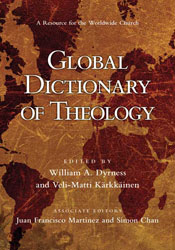 The emergent-friendly, Global Dictionary of Theology, makes a distinction between ‘Hopeful Universalism’ and ‘Convinced Universalism’:
The emergent-friendly, Global Dictionary of Theology, makes a distinction between ‘Hopeful Universalism’ and ‘Convinced Universalism’: Indeed, in the very preface of Love Wins, Bell contradicts Jesus’ teaching that few would actually be saved. Bell writes:
Indeed, in the very preface of Love Wins, Bell contradicts Jesus’ teaching that few would actually be saved. Bell writes: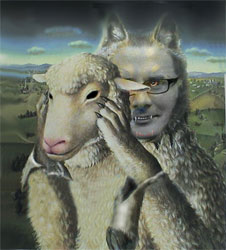 It is a sobering thought that Jesus went on to state in the verses immediately following His teaching on the narrow and broad roads, that false prophets would come in sheep’s clothing (Matthew 7:15-21). Such false prophets stand at the cross roads between the broad and narrow road, claiming to represent Christ, while pointing their followers toward the broad road that leads destruction, assuring them that it eventually leads to Heaven. Consider this for a minute. Isn’t this exactly what Rob Bell is doing?
It is a sobering thought that Jesus went on to state in the verses immediately following His teaching on the narrow and broad roads, that false prophets would come in sheep’s clothing (Matthew 7:15-21). Such false prophets stand at the cross roads between the broad and narrow road, claiming to represent Christ, while pointing their followers toward the broad road that leads destruction, assuring them that it eventually leads to Heaven. Consider this for a minute. Isn’t this exactly what Rob Bell is doing? Rob Bell not only redefines Hell by teaching that it will only be a temporary abode for those who want to leave later, but he redefines Hell by claiming that it is not so much about the after life, but it’s about what you make of the life here and now. In his book, Velvet Elvis, Bell had already stated this position:
Rob Bell not only redefines Hell by teaching that it will only be a temporary abode for those who want to leave later, but he redefines Hell by claiming that it is not so much about the after life, but it’s about what you make of the life here and now. In his book, Velvet Elvis, Bell had already stated this position: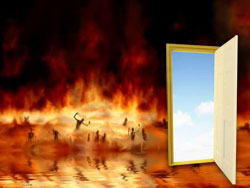 Rob Bell takes every possible liberty to deny reality and to either explain Hell away or get everyone into Heaven, regardless of his or her rejection of God and the Gospel. Bell not only empties Hell of God’s holy wrath, he creates an exit door from the inside out and claims that Hell is merely what we make it. He also claims that most of the imagery of future judgments in Hell were fulfilled on earth in AD 70 (p. 81).
Rob Bell takes every possible liberty to deny reality and to either explain Hell away or get everyone into Heaven, regardless of his or her rejection of God and the Gospel. Bell not only empties Hell of God’s holy wrath, he creates an exit door from the inside out and claims that Hell is merely what we make it. He also claims that most of the imagery of future judgments in Hell were fulfilled on earth in AD 70 (p. 81).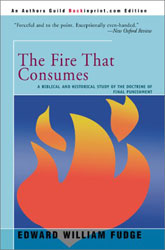 By claiming that the unrepentant wicked will have a chance to get to Heaven from Hell, Rob Bell has gone beyond that of Edward W. Fudge, who states in The Fire That Consumes,
By claiming that the unrepentant wicked will have a chance to get to Heaven from Hell, Rob Bell has gone beyond that of Edward W. Fudge, who states in The Fire That Consumes, 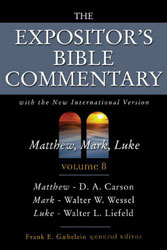 Biblical Scholar D.A. Carson, commenting on Matthew 25:46, says :
Biblical Scholar D.A. Carson, commenting on Matthew 25:46, says :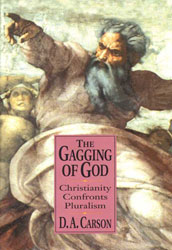 “What is hard to prove, but seems to me probable, is that one reason why the conscious punishment of hell is ongoing is because sin is ongoing.”
“What is hard to prove, but seems to me probable, is that one reason why the conscious punishment of hell is ongoing is because sin is ongoing.” There is hardly any wiggle room for a second chance in hell in these passages or anywhere in Scripture. Bell would have his readers believe of the book of Revelation that
There is hardly any wiggle room for a second chance in hell in these passages or anywhere in Scripture. Bell would have his readers believe of the book of Revelation that  May God give us the grace, in these times of apostasy, to hold fast to Jesus’ teachings and remain faithful to our loving and Holy Lord to the end. May God deliver His bride from the cotton candy Christianity that is endemic in Emergent Churches and among false prophets who lead the lost into believing they can put off repentance until after death.
May God give us the grace, in these times of apostasy, to hold fast to Jesus’ teachings and remain faithful to our loving and Holy Lord to the end. May God deliver His bride from the cotton candy Christianity that is endemic in Emergent Churches and among false prophets who lead the lost into believing they can put off repentance until after death.
waltercmartinjr
In his You-Tube presentation on the “taken and left,” Stephen Bohr indicates that he believes the official position of Pre-Trib is that Christ’s words “one shall be taken, the other shall be left,” are directed at their version of a Pre-trib Rapture. It is true that Pre-trib lay teachers and even some educated Pre-trib ministers use the quote to refer to their Rapture, but all of the official Bibles and official textbooks from Pre-trib teach that when Jesus spoke “one taken and one left,” He was only speaking of His Second Coming. Pre-trib says the Second Coming will occur 7 years after the Rapture. Pre-trib says Jesus was saying the “taken” are the wicked that will be taken to Jerusalem for Judgment, and the “left” are the saved that will enter a Millennial Kingdom here on earth. Thus, Stephen Bohr is actually teaching the same as the Pre-trib official position. The word Jesus used for “taken” is “paralambano,” in the Greek and means “received.” It is used for “marriage” in Scripture. The word Jesus used for “left” is “aphiemi,” in the Greek and means “forsaken.” When Jesus, in John 14:1-3, said “I will come again and RECEIVE you unto Myself,” He said “paralambano,” same word as “taken.” When the disciples said to Jesus, “we have FORSAKEN all and followed You,” they used the word “aphiemi.” Jesus said He would, “send His angels to GATHER His Elect. He then gave some illustrations after which He said, “one shall be taken (received) and one shall be left (aphiemi).” So, when our SDA evangelists claim Pre-trib’s position is that Christ’s words “taken and left” are Rapture proof texts, they are actually telling an un-truth. Does our true SDA message ever need to us un-truths as we proclaim God’s Truth? To be clear I do not want speak negatively about or to Brother Bohr. I watch him speak on 3ABN several times a week. He is indeed a Bible scholar that has done much study. Thanks for allowing me to comment. Sincerely, Walter C. Martin Jr.
Ravonne Nevels
Well, according to what I read in the Bible I’m skeptical about a Pre-trib rapture, but I know I want to be ready whenever the Lord does return. I do believe Christians will go through the tribulation, and if you notice in Matthew 24:27 Jesus states “For as the lightning cometh out of the east, and shineth even unto the west; so shall also the coming of the Son of man be. (Meaning bright and visible); not (Fast) as commonly taught. Right after Jesus makes that statement, He says, “For wheresoever the carcase is, there will the eagles be gathered together.” In Lukes’s account, after Jesus explains about the ones taken and the ones left, the disciples ask Him, “Where Lord?” His answer is, “Wheresoever the body is, thither will the eagles be gathered together.” Which sounds like death to me, and I am inclined to believe He was referring to the ‘left’ ones, because the context of this Chapter is giving us forewarning of what is to come so we will be prepared and ready to meet Him when He comes back for us. He gives the story of Noah and says that they did not know until the day that Noah entered the ark, then the flood took them all away. The ark itself is symbolic of the coming Jesus. The exodus from Sodom and Gomorrah is symbolic of the same. The saved ones were taken out from among the others…then destruction came. Also, to be ‘caught up’ is to be taken out of one’s environment, or when something is ‘gathered’ it is to ‘bring together and take in from scattered places or sources’ ( Oxford Dictionaries) Matthew 24:31 “And he shall send his angels with a great sound of a trumpet, and they shall gather together his elect from the four winds, from one end of heaven to the other.”
II Peter 3:9-12-14 states “The Lord is not slack concerning his promise, as some men count slackness; but is long suffering to us-ward, not willing that any should perish, but that all should come to repentance. But the day of the Lord will come as a thief in the night; in the which the heavens shall pass away with a great noise, and the elements shall melt with fervent heat, the earth also and the works that are therein shall be burned up. Seeing, then that all these things shall be dissolved, what manner of persons ought ye to be in all holy conversation and godliness, Looking for and hasting unto the coming of the day of God wherein the heavens being on fire shall be dissolved, and the elements shall melt with fervent heat?” “Nevertheless we, according to his promise, look for new heavens and a new earth, wherein dwelleth righteousness.” “Wherefore, beloved, seeing that ye look for such things, be diligent that ye may be found of him in peace, without spot, and blameless.” I haven’t ever been able to separate the “Rapture” from the “Second Coming” because whenever I’ve inquired, the verses they’ve used are the same ones for each event, and I don’t see how that’s possible if they are two separate events. Also, II Thessalonians 7-10 states…”when the Lord Jesus shall be revealed from heaven with his mighty angels, In flaming fire taking vengeance on them that know not God, and that obey not the gospel of our Lord Jesus Christ: Who shall be punished with everlasting destruction from the presence of the Lord, and from the glory of his power; When he shall come to be glorified in his saints, and to be admired in all them that believe (because our testimony among you was believed) in that day.” This is our hope and glory. No, we do not want to see the wicked destroyed, but we long to see Jesus and have Him come back for us. Many say that these verses refer to the ‘Second Coming’, but I can’t see that because it states when he shall come ‘to be glorified in his saints’ and ‘to be admired in all them that believe’. If it were the Second Coming and the saints were coming back with Him after the 1000-year period, we would have already been glorified. Anyway, there are so many opinions on the subject, and I pray that we who love Him will be ready and prepared when He comes, and that we win as many others to Christ as possible. Love and Peace Always